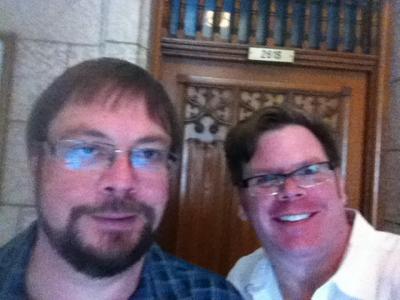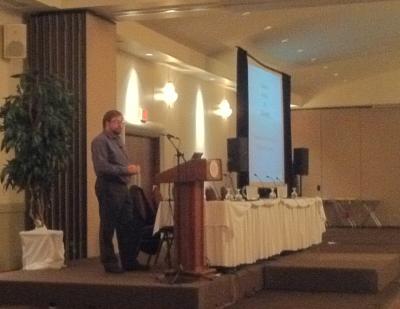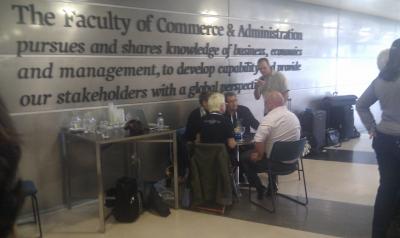A hat-trick of itSMF conferences - it is all about the local level.
I have recently returned from doing three keynotes back-to-back: at the itSMF Denmark Spring Conference in Copenhagen (they have another one in Autumn as well); at itSMF Canada's National Capital Region conference in Ottawa; and the itSMF New Zealand national conference here in Wellington. How lucky was that: to get to speak in three of the friendliest countries in the world? ( A BIG thank-you to all those who made it possible). Apart from the obvious conclusion that those three countries have some of the best airports, there is one other conclusion I draw from all three events: itSMF is primarily about the local level, and needs to start acting that way.
Denmark is a small country but still the itSMF must service their constituencies in centres other than Copenhagen - most of the attendees were from the capital city. itSMF Canada struggles to serve their huge nation with a roadshow: the Ottawa chapter arranged their own event. Even in little New Zealand we battle the parochialism between Auckland and Wellington, not to mention a faltering economy: guess where most attendees were from. It will be interesting to see how many Australians get all the way over to Perth in August. The advantage they have is that Oz is one of the richest countries in the world right now, but it is at least four hours flying to get to Perth. From anywhere.
It seems to me that the context in which itSMF provides the greatest service to members is local, not national or international.

Skep and ServiceSphere's excellent adventure in Ottawa Parliament

Looking slightly less of a dufus onstage
National activities seem ill-suited to members' needs. Perhaps in itSMF's two power bases, UK and USA, this is not so apparent. In the USA, the Yanks use planes like buses (and they feel like buses). And in the UK, maybe the power and population of London somewhat swamps the rest? But I venture to say that in many countries there are regions who feel left out of national conferences.
And of course the international activities have never had much relevance to the majority of members. Some of those activities are not even in the interests of members, when itSMF has acted as the power group for vendors more than practitioners. Others are activities where it is questionable whether it is even itSMF's role, such as translating books on the cheap for TSO, or creating arcane accreditation systems. Certainly there are important activities at the international level, but these should not be the sole or even the main function of itSMFI. Little of itSMF International's activity seems to have any direct relevance to local chapters: where is the effective communications mechanism? The membership administration system? Resources to help run local meetings? Content for local meetings? Formal funding structures for local events?

ITSM Weekly The Podcast Antipodean Edition records live at the itSMF NZ national conference
Some countries do well at a local level. Lucky for me, New Zealand is one of them. The fact that it varies wildly from country to country clearly shows itSMF International is having zero influence at this level. It is entirely dependent on the efforts of local volunteers.
And yet I think the local level is where the maximum value of itSMF comes from. Practitioners who are too shy to get up in front of a national conference are more ready to talk to a few dozen local peers. This is also where the national speakers cut their teeth. We still get vendor bullshit presented at a local level, but since they aren't paying the same sponsor fees as a national event, they are less arrogant in presenting overt product pitches (unlike one of the vendors at the recent national conference here in New Zealand). And of course the networking is one of the major benefits, and maximum value of networking comes at a local level.
I'm not saying their should be no national or international bodies or events, but I do think it is time those bodies re-examined their priorities. I think national and international itSMF should give primary focus to fostering activities at the local level. This would be a complete reversal of the current situation.
P.S. I was honoured and surprised to be awarded the inaugural ITSM Champion Award by itSMFnz at the conference - there are a few good things at the national level :)


 Made in New Zealand
Made in New Zealand 

Comments
"Obviously you need a
"Obviously you need a national head to support all the locals and to provide some consistency of structure and focus. Otherwise it's anarchy, with every local group defining who and what they are."
I disagree. I still think that itSMF branches should be like PMI ones: Local independent entities.
international identity
Sorry Bob, I agree with Visitor: we don't want itsmfusa or.any other country defining a national identity. It was nationalism got us into this stupid governance model in the first place. Itsmf International should provide consistency of structure and focus
Local level
Hi Skep.
First off I'm wondering what Ottawa is up to? First they let you and Chris into our Parliament buildings, then William and Kate just yesterday! I'm sure it will never be the same.
As you know, I've a bit of history with the itSMF at local, national and international levels over many years, and i couldn't agree with you more about the importance of the local spirit and value of events targeted there. At every level of itSMF, the biggest challenge in this is attracting sponsor money. Sadly over the years, I've found that the local sponsor money is scarce, and big vendors want big headcount to make their contributions pay off. But to be fair, I attend many regional and local events around the world and i do see the same few vendors there at every one so some do support local markets.
The other issue is the entertainment value. We've become swept up in the 'hollywood style ITSM conference syndrome'.
As a speaker at many events (and I might even hold a world record for how many countries and local events I've attended), I find that more and more, the audience is looking for the wow factor and being entertained becomes more important than hearing war stories from their peers. Sadly, this is a long ways away from where itSMF began in the early nineties and one that seems to be increasing. It's one thing to be motivated by a keynote speaker who doesn't even know what ITSM is, but large cavernous events devoid of any local flavour and relevance can risk missing the point entirely.
Despite this, I have recently attended a number of smaller, local events and found them to be fantastic and really getting back to sharing experiences and knowledge. I find this encouraging, since I strongly believe the local ecosystem that James refers to is growing and itSMF Boards need to focus some energy on supporting LIGS, SIGS, Regions with money, influence and sponsorships to the events, that aren't all about vegas style wow factor entertainment.
There is a place for that too, but without local momentum, we are at risk of losing the purpose behind the movement and the commercial for-profit event movers and shakers are starting to step in and take this market.
I think Canada has got it right. I may be a bit biased because I am Canadian, but my vantage point is pretty global. As a large geography, they support their local regions and you saw first-hand the results of that in Ottawa in May. Canada was brazen enough to depart from tradition some years ago, and place member interest first by opting for regional events rather than a glitzy national one.
Norway, Denmark, Sweden, NZ, Poland, and numerous others also get it right, and while they benefit from high population density in smaller geography, they still remember their local areas.
If practitioners are shy to get up on stage and share their experience, it might be because they feel like they have to compete with the internationally recognized motivational speakers that permeate the events and many have never heard of ITSM.
itSMF needs to nurture and encourage practitioners to step up by reinforcing that its not entertainment that makes the event good, its the content - FROM MEMBERS.
I still support the itSMF because i believe in its value and the concept of peer power. That's the main reason I will go just about anywhere to speak at a local itSMF event for no fee. I've heard many times from local event organizers that getting even one internationally recognized speaker helps immensely with getting members out to event. I hope for the day, when members crash down gates just to see their colleagues and peers speak. Then we will have all gotten it right...and i can stop collecting so many air miles!
Congrats on the ITSM champion award BTW.
Sharon Taylor
developing the grass roots
Thanks Sharon for your perspective. I think the well-known speakers like yourself or the novelty turns like me are important for all-day or multi-day events that people are asked to pay for. And those events have their place: they are a crucible of new ideas and new connections.
But at least as important are the smaller, more frequent, free get-together of dozens of local people. This is where those new ideas first see the light from real-world practitioners. We have a very successful monthly event in Wellington run by Terry Barwick and a team of dedicated volunteers. Sponsors provide a venue, food and booze. The national itSMF provides a share of membership fees to top up when sponsors fall short. An audience of 20-40 is not so intimidating, so we get first-time speakers with wonderful reports from the coalface, mixed with vendor spiels of varying value, and the occasional eccentric like me.
It is like sport. If you don't have the local club teams you don't developed big league players. THAT is where I think national itSMF attention varies . And don't see International doing anything at all to encourage it or develop resources for local level.
Where the work is
Virtual interconnectedness is useful, and does create a community. But it is a parallel community. The local community is one of genuine human contact - you know, chatting, sharing a beer, giving each other a lift home, having coincidental connections. The virtual world is only a pale facsimile of the real community, a shallow and superficial one. If i don't see your smile for real now and then the relationship is not the same.
More importantly the local community is where the work is. Oh sure I derive income from my virtual networks and I'd like to derive more. But the vast majority of us get our work locally, and networking is essential.
So I'm all for itSMF International providing virtual communities, although as James says the community has already done that, in true Cluetrain Manifesto fashion. And I'm all for itSMFI approving (IPESC) or developing IP, though I'd suggest the community has already well and truly done that too, as a simple Amazon search reveals. But the real value it ought to be providing and isn't is what Bob said: resources and communications in support of local chapters.
As for national-level organisations, I'm not sure. There's a lot I don't know yet about how ISACA organises, but I find it interesting that there is an ISACA Auckland and an ISACA Wellington, but not as far as I know an ISACA New Zealand. There's a strong international infrastructure and local chapters. No need for intermediate layers. Then again we Kiwis aren't so into throwing our nationalist weight around as some countries. We just get on and get the job done, as the itSMFI Vice Chair is currently demonstrating.
All politics is local
Being a part of the Minnesota LIG of itSMF USA, I would agree that local is where most of the activity occurs, which tends to make it more relevant to members than national, or international. The strength, size and activity level of the various US LIGs varies widely; MN happens to be a very large and active one. We're always looking for ways to better promote our meetings, bring in better speakers and reach out to more potential members. What we'd like from national is resources that support those goals; and for them to provide ways to connect and communicate between the various LIGs. Leverage some networking of the LIGs to share some best practices on how to manage a LIG successfully.
Obviously you need a national head to support all the locals and to provide some consistency of structure and focus. Otherwise it's anarchy, with every local group defining who and what they are.
Best Regards,
BobGrins
Local is where the value is
Hi Skep
Great post (and congratulations on what sounds like a hectic tour!)
I'm active in 2 local areas of the UK itSMF - the CSI Special Interest Group, and the Northern Regional Group. The national conference is great and a good chance to catch up, but the more local and specialised areas are where we really get stuck into things in smaller forums of like minded people.
A few years back some of the regional groups were merged to form larger groups, which can make some of the meetings a challenge to get to.
Something we feel UK itSMF needs to improve is its web presence - forums, wikis etc to allow collaboration when travel isn't possible.
All the national chapters can definitely learn from each other and improve - continually of course :-)
Claire
The Role of Social Media
OK with my involvement with the ITSM Weekly Podcasts I'm kind of honour bound to make the comment that social media can help to "make global local" by enabling small groups of like minded individuals to get together virtually, and to bring advice and support to the more far flung parts of the world, you know, like New Zealand and the USA.
In all seriousness I find being able to collaborate and discuss ITSM with Charlie, Aale, Cary and co. an immense benefit.
Clare's quite right that itSMFUK could improve its web presence, but that doesn't mean there is a vacuum waiting to be filled in its absence - the gap is already being filled. The challenge for itSMF chapters is to fit into the new eco-system.
James Finister
www.tcs.com
www.itsmwprow.com
http://coreitsm.blogspot.com/
Me too
I value these discussions quite a lot and felt that it was great meeting you guys in Pink11. It is not easy to find any depth in conversation at the local itSMF.
Aale